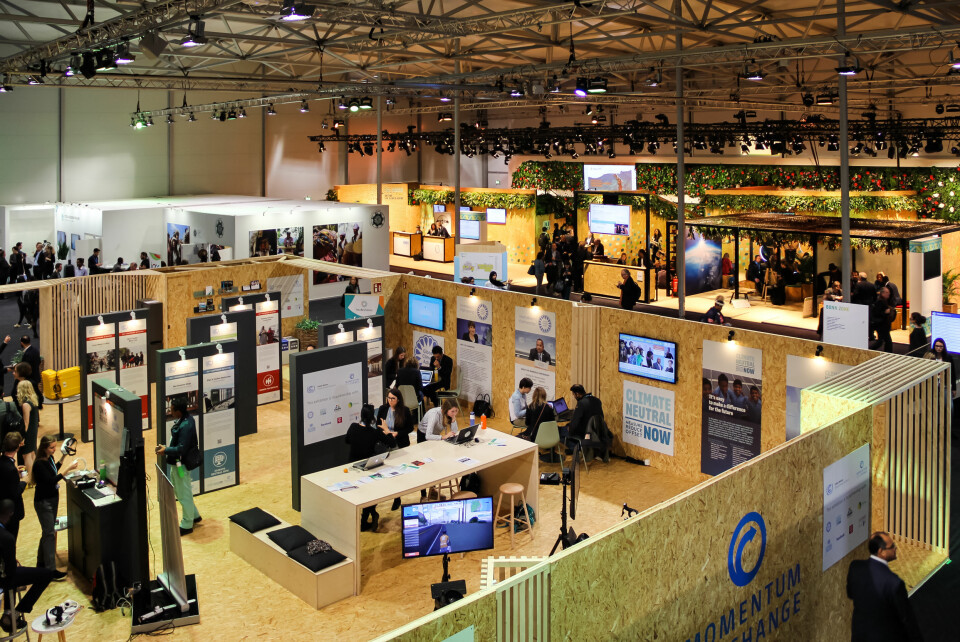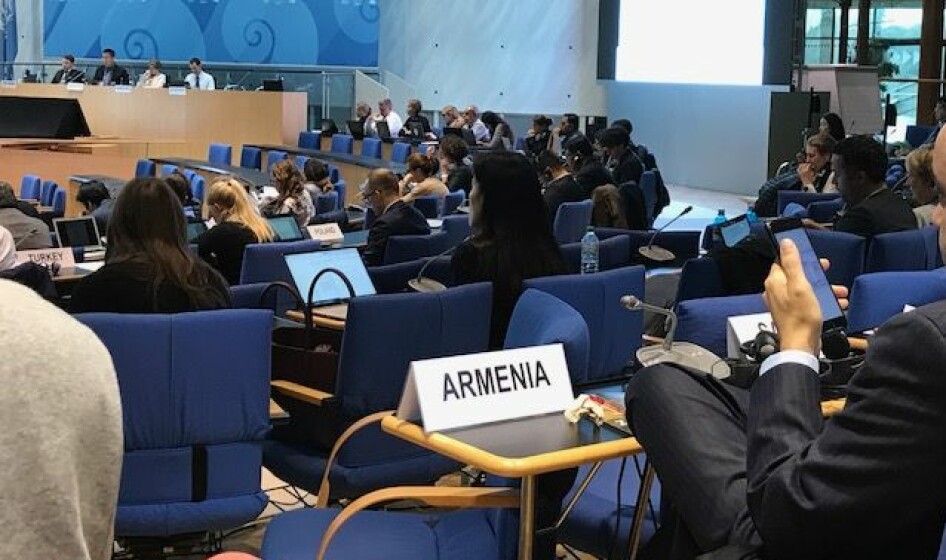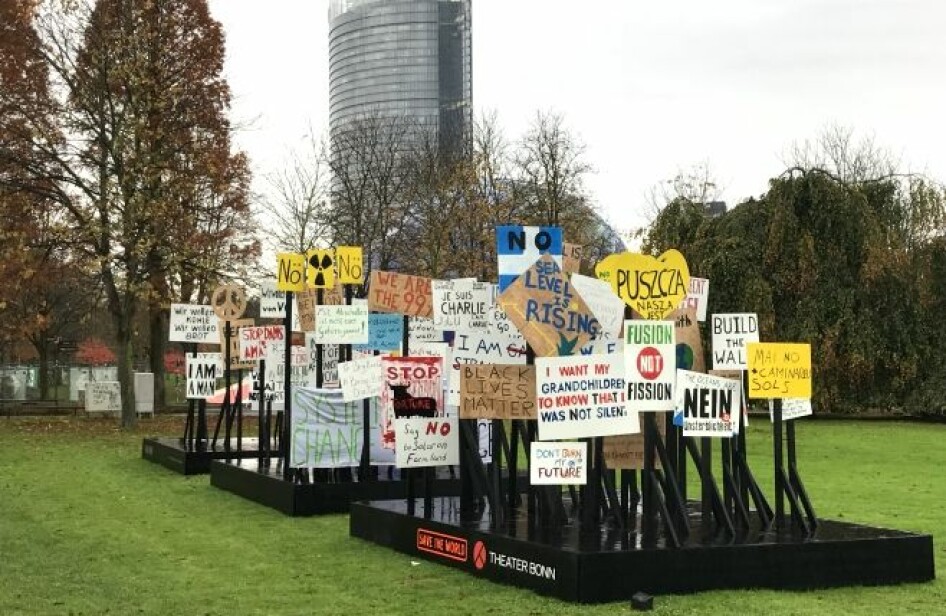
Political justice in the climate negotiations: The personal reflections of a yellow badge
Few international negotiations attract such a broad collection of peoples of the Earth as the Conferences of the Parties (COP) to the United Nations Framework Convention on Climate Change (UNFCCC).
Analysing the COP23 negotiations in Bonn, GLOBUS researcher Solveig Aamodt argues that while states are the legally recognized claimants of justice in the negotiations, some steps have been taken to give those most vulnerable to climate change a due hearing.
Is there any role at all for non-state actors in such negotiations?
This post is the latest entry in a series about the COP climate negotiations on the Global Justice Blog.
A long and winding road from theory to practice
From the indigenous chief with feathered hairbands to the top state negotiator in a pinstriped suit, and from the rich Hollywood star to the Pacific island villager who has lost her livelihood in floods: They all come to Bonn with the agenda of influencing the climate negotiations. How much influence can different policy actors – an individual, an interest group, or a country – expect to have when the 197 parties of the UNFCCC seek to reach an agreement? Whose voices need to be heard if this agreement is to be considered just?
Aiming to enhance our understanding of global political justice and particularly the EU as a global justice actor, the GLOBUS project starts with outlining how three different theoretical justice perspectives prioritise differently regarding which actors are best suited to ensure just solutions in global governance.
The perspective of justice as non-domination prioritises states because states are seen as best equipped to provide justice for the inhabitants within their jurisdictions.
The perspective of justice as impartiality prioritises differently, highlighting that states may fail to take the views of their citizens into account. According to this perspective, individuals must be heard at the global level to secure a solution that is ‘justifiable’ to all.
A third perspective, justice as mutual recognition, argues that it is not always enough to treat all individuals the same way. Sometimes, particular groups may be in a situation that requires their claims to be considered as particularly strong. This perspective calls for an actual due hearing of all voices – states, individuals, and groups – but also for differentiated solutions.
Find yourself a pink badge!
Some prioritisations were made at the UNFCCC's foundation in 1992. The UNFCCC is structured according to the UN principle of one country–one vote, and states are thus the legally recognized claimants of justice in the negotiations. At COP23 this legal distinction was even more visible than it has been at previous COPs. The COP venue in Bonn was divided into two parts: the Bonn Zone where all the registered participants had access, and the Bula Zone where only participants registered as delegation members or observers had access.
Inside the Bula Zone only the delegation members, bearing pink identification badges, had access to all the meetings. The observers, with yellow badges, were given limited access to the ongoing negotiations. In practice, one or a group of ‘pink badges’ could decide that any negotiation should be closed to observers.
To influence the political outcome at COP, you need to be a part of a country’s official delegation, or you need to convince one of the (top) pink badges to voice your concern for you.
From the perspectives of justice as impartiality or mutual recognition, which argue that the justice claims of individuals and groups need to be considered and prioritised, these strict access distinctions are concerning. Many civil society actors representing those most vulnerable to climate change impacts, like future generations, poor communities, and indigenous peoples groups, have at best restricted access to following the negotiations.

To influence the political outcome at COP, you need to be a part of a country’s official delegation, or you need to convince one of the (top) pink badges to voice your concern for you. The many NGOs that travelled to COP23 to bring forth climate justice claims were placed in the Bonn Zone, and few pink badges, especially few top negotiators, found the time to go there and listen to their claims.
Segmenting domestic and international injustice
Nevertheless, by including civil society and young people’s representatives in their delegations, many countries do take steps to meet the concerns regarding individuals’ and groups’ rights to inclusion and due hearing in the negotiations. However, in many countries, the possibility to influence policymaking is unequally distributed between societal groups. The COP delegations usually mirror such domestic inequalities.
Even from the perspective of justice as non-domination, which considers states to be the best-suited actors for claiming justice on behalf of its inhabitants, the COPs can be criticised. This is because countries are not equal parties in terms of their historical responsibility for climate change or in terms of their anticipated societal costs of climate impacts. Globally these two variables are negatively correlated, and the most vulnerable countries are the ones with least economic and political resources in the negotiations.
The countries that are most responsible for the accumulation of greenhouse gases in the atmosphere are the ones that can afford large and well-prepared COP delegations, something that increases the large and rich countries’ ability to dominate the agendas and outcomes of the negotiations. In adapting to increasing climatic changes, small island states depend on finance from rich countries. However, at COP23 the rich countries kept postponing the final decisions on the agenda items on adaptation and climate finance. The vulnerable states see these postponements as an unfair downgrading of their concerns in the negotiations.
From the individual to the global – and back again
Climate change is a complex issue that requires changes in all societies. It is the accumulation of our individual choices and actions that cause the climate problem. If individuals are to be the rightful claimants of climate justice, all would have to agree on a fair distribution of the responsibility for mitigation and adaptation.
It is the accumulation of our individual choices and actions that cause the climate problem.
When the negotiations between 197 parties have been so difficult, it is hard to imagine that a new global governance model including the due hearing of all individuals and groups could make any progress at all. It might be more fruitful to work within the current legal framework of state parties to improve the delegations’ just hearing and representation of claims form civil society and vulnerable communities in their countries. After all, some delegations already manage to do that quite well.

Because of the slow progress in the negotiations, many have given up on the whole idea of global climate governance. Communities and individuals around the world are initiating their own solutions, like low-carbon cities initiatives, farmers switching to more climate robust crops, and people becoming vegetarians and installing solar panels. Interestingly, all these actors also came to Bonn. The more the official negotiators quarrel and spend hours on discussing footnotes, the more energy is brought to these parallel processes where individuals, groups, and communities meet to exchange information and join in initiatives.
Despite its deficits, the UNFCCC process has created an arena for addressing several issues related to climate justice. The inclusion of articles on gender equality and indigenous peoples’ rights in the Paris Agreement show a global priority of concerns that are poorly addressed in many countries. I was in the room when Syria, being the only country that had not yet signed, announced that it will sign the Paris Agreement. Somehow the gloomy cloud of the United States’ announced withdrawal from the agreement lifted a bit. As one EU delegate told me, ‘the US withdrawal came too late’to influence the negotiation outcome.
Although the global negotiations move much slower than what is required by science, a political tipping point has been reached: Hollywood star, top negotiator, or villager – we have acknowledged that we are in this together.
This blog was written as part of the research project GLOBUS Reconsidering European Contributions to Global Justice (funded by the EU’s Horizon 2020 programme) and first published at the Global Justice Blog www.globus.uio.no







